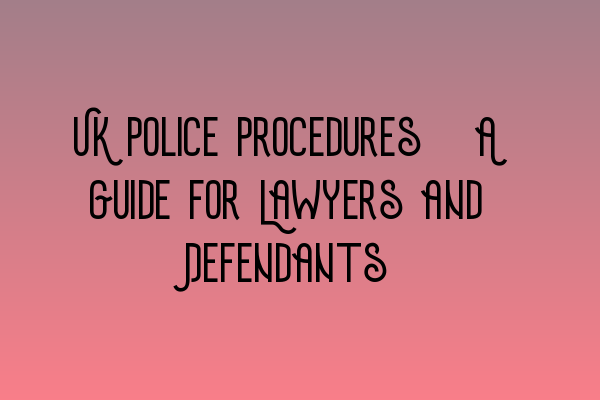UK Police Procedures: A Guide for Lawyers and Defendants
As a solicitor specializing in criminal law and practice, it is crucial to have a comprehensive understanding of UK police procedures. This knowledge not only helps lawyers navigate the legal system effectively, but it also ensures that defendants receive fair treatment and due process.
Arrest Procedures
When a person is arrested in the UK, it is essential to understand the procedures involved. The police must have reasonable grounds to believe that the individual has committed an offense. They must also inform the person why they are being arrested and provide them with their legal rights.
During the arrest, the police have the power to conduct a search of the suspect and their belongings. However, this search should be conducted in accordance with the law and respect the individual’s rights.
Detention and Interview
After the arrest, the suspect may be taken to a police station for detention and questioning. It is important for lawyers to be familiar with the procedures surrounding detention and interview.
During detention, the police must inform the suspect of their rights, including the right to remain silent and the right to legal representation. As a lawyer, it is crucial to ensure that these rights are upheld and that your client understands them fully.
During the interview, the suspect may be asked questions related to the alleged offense. It is essential for lawyers to prepare their clients for the interview and advise them on how to respond appropriately.
Evidence Gathering
In criminal cases, evidence plays a pivotal role in establishing guilt or innocence. It is important for lawyers to understand how the police gather and present evidence.
The police have the power to collect evidence through various means, such as witness statements, forensic analysis, and surveillance. As a lawyer, it is essential to review the evidence thoroughly and identify any inconsistencies or potential issues with its collection.
Challenging Police Procedures
While the police are entrusted with upholding the law, their procedures are not infallible. Lawyers have a crucial role in ensuring that due process is followed and that any misconduct or improper procedures are challenged.
It is important to be aware of your client’s rights and to thoroughly investigate the circumstances surrounding their arrest and detention. By identifying any breaches of procedure or misconduct, lawyers can effectively challenge the evidence presented and seek to have it excluded from the case.
Conclusion
Having a thorough understanding of UK police procedures is essential for lawyers practicing in the field of criminal law. By understanding the arrest procedures, detention and interview processes, evidence gathering methods, and the ability to challenge police procedures, lawyers can navigate the legal system effectively and protect the rights of their clients.
